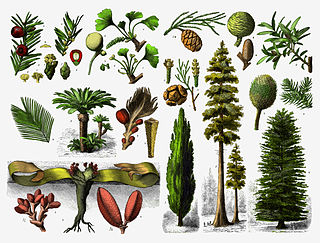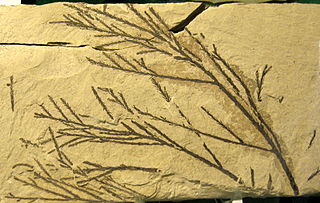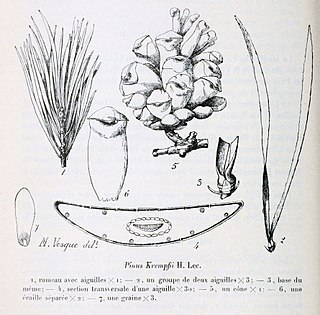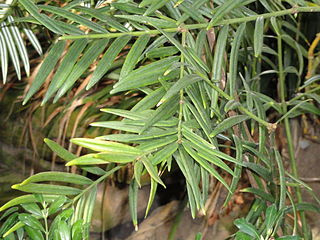
The gymnosperms, also known as Acrogymnospermae, are a group of seed-producing plants that includes conifers, cycads, Ginkgo, and gnetophytes. The term "gymnosperm" comes from the composite word in Greek: γυμνόσπερμος, literally meaning "naked seeds". The name is based on the unenclosed condition of their seeds. The non-encased condition of their seeds contrasts with the seeds and ovules of flowering plants (angiosperms), which are enclosed within an ovary. Gymnosperm seeds develop either on the surface of scales or leaves, which are often modified to form cones, or solitary as in yew, Torreya, Ginkgo.

Podocarpaceae is a large family of mainly Southern Hemisphere conifers, comprising about 156 species of evergreen trees and shrubs. It contains 19 genera if Phyllocladus is included and Manoao and Sundacarpus are recognized.

Podocarpus is a genus of conifers, the most numerous and widely distributed of the podocarp family, the Podocarpaceae. Podocarpus species are evergreen shrubs or trees, usually from 1 to 25 m tall, known to reach 40 m (130 ft) at times. The cones have two to five fused cone scales, which form a fleshy, berry-like, brightly coloured receptacle at maturity. The fleshy cones attract birds, which then eat the cones and disperse the seeds in their droppings. About 97 to 107 species are placed in the genus depending on the circumscription of the species.

Nageia is a genus of conifers belonging to the podocarp family Podocarpaceae. Nageia includes evergreen shrubs and trees, from one to 54 meters in height. A 2009 treatment of the genus recognized five species. Some authors consider Nageia formosensis to be a separate species from Nageia nagi, thus recognizing six species. The podocarp genera have been reshuffled by various botanists. Most recently, several species formerly classed as Nageia were moved to the new genus Retrophyllum, while Nageia falcata and Nageia mannii were moved to the new genus Afrocarpus.

Podocarpus macrophyllus is a conifer in the genus Podocarpus, family Podocarpaceae. It is the northernmost species of the genus, native to southern Japan and southern and eastern China. Common names in English include yew plum pine, Buddhist pine, and fern pine. Kusamaki (クサマキ) and inumaki (犬槇) are Japanese names for this tree. In China, it is known as 羅漢松 or luóhàn sōng, which literally means "arhat pine".

Glyptostrobus, is a small genus of conifers in the family Cupressaceae. The sole living species, Glyptostrobus pensilis, is native to subtropical southeastern China, from Fujian west to southeast Yunnan, and also very locally in northern Vietnam and Borikhamxai Province of eastern Laos near the Vietnam border.

Amentotaxus is a genus of conifers (catkin-yews) comprising five species, treated in either the Cephalotaxaceae, or in the Taxaceae when that family is considered in a broad sense. The genus is endemic to subtropical Southeast Asia, from Taiwan west across southern China to Assam in the eastern Himalaya, and south to Vietnam. The species are evergreen shrubs and small trees reaching 2–15 m tall.

Cupressus torulosa, commonly known as the Himalayan cypress or Bhutan cypress, is a species of cypress tree native to the mountainous northern regions of the Indian Subcontinent, primarily the Himalayas.

Pinus krempfii, or Krempf's pine, is a rare species of pine, endemic to the central highlands of Vietnam in the Da Lat–Nha Trang area. It is unusual in that it has flat needles. Because of this anomaly, it is put in its own subsection, the Krempfianae.

Amentotaxus argotaenia, the catkin yew, is a species of conifer in the family Taxaceae. It is a shrub or a small tree up to 7 metres (23 ft) tall.

Amentotaxus formosana, the Taiwan catkin yew, is a species of conifer in the family Taxaceae. It is a small tree to 10 m (33 ft) tall, with a slender trunk. It was previously recognised as a variant of Amentotaxus argotaenia.
Amentotaxus poilanei is a species of conifer in the yew family, Taxaceae. It is endemic to Vietnam. Its common name is Poilane's catkin yew.

Amentotaxus yunnanensis, the Yunnan catkin yew, is a species of conifer in the yew family, Taxaceae. It is native to Laos, Vietnam, and Guizhou and Yunnan in China.

Podocarpus angustifolius is a species of conifer in the family Podocarpaceae. It is endemic to Cuba.
Podocarpus annamiensis is a species of conifer in the family Podocarpaceae. It is found on Hainan Island of China and in Myanmar and Vietnam. It is threatened by habitat loss.
Podocarpus coriaceus, commonly known as the yucca plum pine, is a species of conifer, an evergreen tree in the family Podocarpaceae. It is found in the Dominican Republic, Guadeloupe, Martinique, Montserrat, Puerto Rico, and Saint Kitts and Nevis.

Podocarpus laetus is a species of conifer in the family Podocarpaceae, commonly known as Hall's tōtara, mountain tōtara or thin-barked tōtara. Previously known as Podocarpus hallii and Podocarpus cunninghamii, in 2015 it was realised that the much earlier name P. laetus has priority. Its common name results from the species being named after J. W. Hall, a New Zealand pharmacist.

Podocarpus neriifolius is a species of conifer in the family Podocarpaceae. It grows 10–15m tall, though very occasionally taller, in tropical and subtropical wet closed forests, between 650m and 1600m altitude. In Cambodia however it grows in a dwarf form some 2–4m tall, at Bokor, some 1000m elevation.
Podocarpus pilgeri is a species of conifer in the family Podocarpaceae. It is a small to medium-sized tree that is found in India and Bangladesh, Indochina and Malay Archipelago. Its timber is hard and water-resistant.
Calocedrus rupestris is a species of conifer recently discovered in highly eroded rocky limestone mountains in northern Vietnam and first described in 2004. It also occurs in China.















